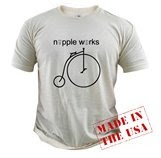
Ever noticed how loud and clicky some high end bike hubs are? Why? The picture above gives a clue. The pawls on this Zipp brand hub are large, thin and sprung by a long leaf spring. They are bound to make more clicking noise as you coast. Compare that to an older style hub:
 Why do the Zipp pawls make more noise?
Why do the Zipp pawls make more noise?-WARNING WARNING, SUPER TECHNICAL DISCUSSION AHEAD-
- Each of those little pawls is like a diving board (or extended simply supported beam). Each one vibrates as it clicks through the teeth of the mating part (the black hub body in the picture), much as a diving board vibrates after the diver jumps off. The frequency of that vibration is dictated by the following equation:
-

Although I don't know this for sure, I imagine that the Zipp hub comes packed with less heavy grease than an older style hub since lower rotating resistance is much more important than longevity to the owner of the Zipp hub. That grease would act to deaden the sound of each pawl strike.
I hope you enjoyed today's nerd-out. Tune in next time for a discussion of flux capacitors.
Pictures from http://www.pezcyclingnews.com/ and http://www.roadcyclinguk.com/


1 comment:
Yes, I think that super clicky hubs have now been equated with high quality wheels. It used to be that quiet smooth bike parts were higher quality, and the clicking was left to kids with Jose Canseco cards rattling in their spokes. Like all road bike fads, it will reach a level of extreme absurdity then fade away.
Post a Comment